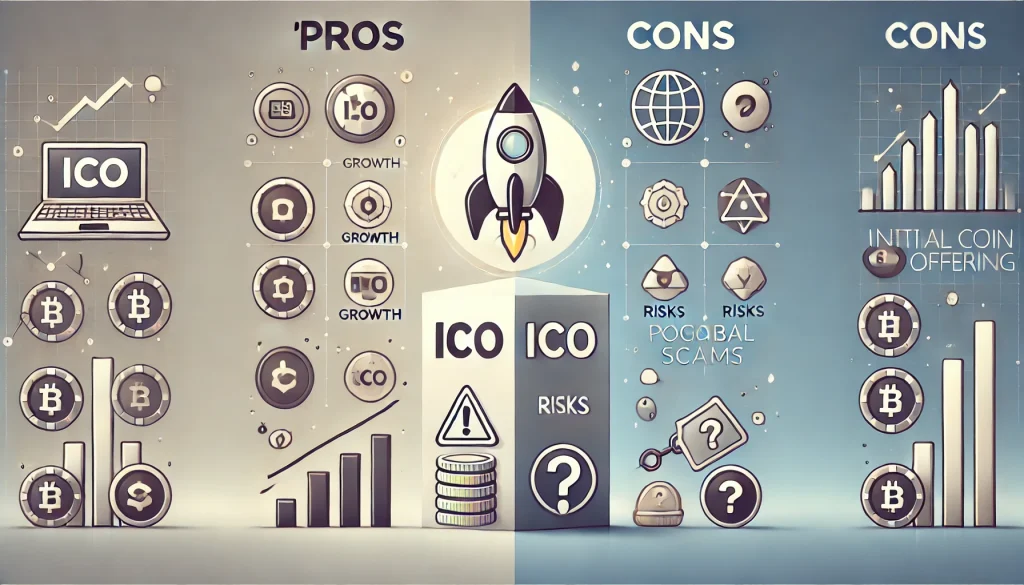Introduction

In the ever-evolving world of cryptocurrency, the concept of initial coin offerings (ICOs) continues to intrigue both novice and seasoned investors alike. As we move into 2024, understanding ICOs is more important than ever. In this review, we take a closer look at the current state of ICOs and explore whether they are still a viable investment strategy in the modern market. We look at the key features, advantages, and disadvantages, and present a balanced view of this funding method.
Overview
An initial coin offering (ICO) is a funding mechanism often used by startups to bypass traditional methods of raising capital, such as venture capital or banks. In 2024, ICOs are still a popular way to launch new cryptocurrencies. Early investors get the opportunity to purchase tokens before the cryptocurrency hits the market, potentially at a lower price. Despite regulatory issues and market volatility, ICOs are still an attractive option due to the potential for high returns.
The main features of an ICO include
- Decentralized funding: ICOs allow companies to raise funds without relying on traditional financial institutions.
- Token sale: Investors receive tokens, which they can later use within the issuing company’s ecosystem or trade on cryptocurrency exchanges.
- Global reach: ICOs allow companies to access a global pool of investors, giving them access to a wider range of funding opportunities.
Pros and cons

Pros
- High potential returns: ICOs can offer significant returns, especially if the project is successful and the token value increases.
- Access to innovative projects: ICOs often fund high-tech projects that are difficult to fund traditionally.
- Decentralized: Investors can participate in projects without geographical restrictions or approval from traditional financial institutions.
- Liquidity: Tokens are often traded on cryptocurrency exchanges shortly after an ICO, which can provide liquidity for investors.
Cons
- High risk: Due to the lack of regulation, many ICOs carry significant risk, including the possibility of fraud.
- Market volatility: Cryptocurrency markets are notoriously volatile and token values can fluctuate rapidly.
- Regulatory uncertainty: The legal landscape for ICOs is still evolving, with many countries imposing strict regulations or banning them outright.
- Technical complexity: Understanding the technical aspects of a project can be a challenge for the average investor.
Deep dive analytics

Design and functionality
The design of an ICO centers around the creation of a new token or cryptocurrency, usually based on a blockchain platform like Ethereum. The functionality of these tokens can vary greatly depending on the goals of the project. Some tokens are intended to be used within a specific ecosystem, while others may represent ownership or voting rights.
Usability
In recent years, ICOs have become more user-friendly, with the process of purchasing tokens streamlined; however, understanding the underlying technology and assessing the viability of a project remains complex.
Security
Security is an important concern in ICOs. Blockchain technology offers a level of security through decentralization and encryption, but the lack of regulation makes ICOs a target for fraud and scams. In 2024, projects that prioritize security and transparency are more likely to succeed.
Risk
Performance
The performance of ICOs is highly variable. A successful ICO from a reputable team with clear and achievable goals can provide significant returns. However, many ICOs fail to deliver on their promises, often resulting in significant losses for investors.
Regulatory environment
In 2024, the regulatory environment for ICOs will become more stringent, with countries like the United States and the European Union implementing stricter guidelines. While this has led to a decline in the number of ICOs, those that do launch are generally more compliant and transparent.
Comparison to similar offerings
When comparing ICOs to other fundraising methods, such as security token offerings (STOs) or exchange offerings (IEOs), a few key differences emerge:
STOs are more heavily regulated, providing a higher level of security for investors, but you’re unlikely to see high returns.
IEOs are conducted through exchanges, which can provide a layer of security and reduce the risk of fraud, but often come with higher fees.
ICOs are less regulated but offer greater flexibility and potentially higher rewards, but at the cost of increased risk.
| Features | ICO | STO | IEO |
|---|---|---|---|
| Regulation | Low | High | Medium |
| Potential returns | High | Medium | Medium |
| Risk Level | High | Low | Medium |
| Accessibility | Global | Restricted by regulation | Exchange-dependent |
| Security | Variety | High | Medium |
Conclusion
Overall, initial coin offerings in 2024 continue to offer significant opportunities for high returns, but they also carry significant risks. Investors should approach ICOs with caution and do thorough research to understand the potential pitfalls. ICOs remain an attractive option for those willing to take on higher risk, but the increased regulatory scrutiny and market volatility should not be overlooked.
Rating
3.5/5 – ICOs are a viable investment option with significant potential rewards, but the high risks and regulatory issues require careful consideration.
FAQ
What is an initial coin offering (ICO)?
An ICO is a way to raise funds by selling a new cryptocurrency or token to early investors.
Are ICOs legal?
The legality of ICOs varies from country to country, and some countries have strict regulations or bans.
What are the risks of investing in an ICO?
Risks include market volatility, regulatory uncertainty, and the possibility of fraud.
See also
- Association of Certified Fraud Examiners. (n.d.). Initial coin offerings and the risk of fraud. Fraud Magazine. Retrieved August 12, 2024, from https://www.fraud-magazine.com/article.aspx?id=4295000887
- Montague Law. (2023, December 28). Legal considerations for initial coin offerings (ICO) in 2024. Retrieved August 12, 2024, from https://montague.law/blog/legal-considerations-for-initial-coin-offerings-2024/
- Howell, S. T., Niessner, M., & Yermack, D. (2020). Initial coin offerings: Financing growth with cryptocurrency token sales. Journal of Financial Economics, 136(1), 65-87. https://doi.org/10.1016/j.jfineco.2020.04.005
- Investopedia. (n.d.). Initial coin offering (ICO). Retrieved August 12, 2024, from https://www.investopedia.com/terms/i/initial-coin-offering-ico.asp
- The Motley Fool. (n.d.). Initial coin offering (ICO). Retrieved August 12, 2024, from https://www.fool.com/terms/i/initial-coin-offering/
- MiniOrange. (2023, May 22). What is initial coin offering? Retrieved August 12, 2024, from https://www.miniorange.com/blog/what-is-initial-coin-offering/
